| Srl | Item |
| 1 |
ID:
120373
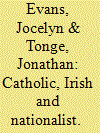

|
|
|
|
|
| Publication |
2013.
|
| Summary/Abstract |
Irish national identity, political nationalism and Catholicism are the defining characteristics of the minority community in Northern Ireland. These identifiable ethno-national and ethno-religious characteristics have been the basis of communal solidarity that has transcended increasing socio-economic heterogeneity within that community. Both of the Nationalist political parties in Northern Ireland, Sinn Féin and the Social Democratic and Labour Party (SDLP), draw their support almost exclusively from their community of origin. What is not known, however, is the relative importance of Irishness, Catholicism and Nationalism in shaping support for either party. Which of these ethnic identifiers is of greatest salience in identifying support for Sinn Féin or the SDLP? Drawing upon recent election survey evidence, this article attempts to rectify this information deficit, highlighting the weighting of components of ethnicity in determining intra-bloc political allegiances.
|
|
|
|
|
|
|
|
|
|
|
|
|
|
|
|
| 2 |
ID:
112067
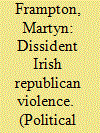

|
|
|
|
|
| Publication |
2012.
|
| Summary/Abstract |
This article considers the resurgence in dissident Irish republican violent activity in the years since 2007. It examines the reasons why this has occurred, citing the significance of 'intra' republican political developments, alongside important 'secondary' factors, such as the death of influential republicans Brendan Hughes and Brian Keenan. It concludes by noting that the dissident threat seems likely to exist for the foreseeable future, but also emphasises the limits of what they can expect to achieve, with there being little prospect of their emulating the Provisional IRA.
|
|
|
|
|
|
|
|
|
|
|
|
|
|
|
|
| 3 |
ID:
087303
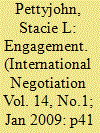

|
|
|
|
|
| Publication |
2009.
|
| Summary/Abstract |
This article argues that under certain conditions the United States can play an important role in peacefully resolving a conflict involving an ally and a nationalist terrorist organization (NTO) by engaging the NTO. An American policy of engagement can bring both parties to the table by convincing them that they are trapped in a mutually hurting stalemate and that negotiations offer the only way out of this situation. In addition, engagement provides the U.S. with significant leverage over both of the disputants, enabling it to push both parties to make the concessions necessary to realize a settlement. However, engagement can only have these effects if the U.S. bias towards its ally is tempered and if its policy is serious, sustained, and conditional. For these conditions to hold, there must be significant domestic support within the United States for a policy of engagement. These arguments are illustrated with case studies of the U.S. engagement of Sinn Fein between 1994 and 2005 and the U.S. dialogue with the Palestine Liberation Organization between 1988 and 1990.
|
|
|
|
|
|
|
|
|
|
|
|
|
|
|
|
| 4 |
ID:
132301
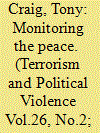

|
|
|
|
|
| Publication |
2014.
|
| Summary/Abstract |
During the Provisional IRA's (PIRA) 1975 ceasefire, two different sets of incident centres were established across Northern Ireland in order to monitor and avert escalation of violence between Republicans and Security Forces. While one group of offices was run by the Northern Ireland Office (NIO) and administered by clerks in the Northern Ireland Civil Service, very quickly Sinn Féin (taking advantage of their decriminalisation in 1974) established their own incident centres to coordinate their communication with the government. This article argues that the establishment of the Sinn Féin incident centres set a precedent for the future political activity of the Provisional Republican Movement; that their activity during the 1975 ceasefire played an important formative role in the evolution of the group's political strategy; and that this experience, acquired from the work done during the 1975 truce, was of far greater influence than is appreciated in current accounts.
|
|
|
|
|
|
|
|
|
|
|
|
|
|
|
|
| 5 |
ID:
112066
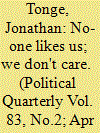

|
|
|
|
|
| Publication |
2012.
|
| Summary/Abstract |
The episodic dissident republican activity evident in Northern Ireland since the Good Friday Agreement has been accompanied by regular assertions from the police, politicians and commentators that dissidents have no backing. This article examines the historic importance of mandates and support for previous and contemporary republican armed campaigns. It explores whether violent republicans have ever enjoyed widespread support in Ireland and assesses the extent to which a lack of backing has precluded violent campaigns. The piece analyses the evidence regarding the lack of sympathy for current dissident violence, assessing the degree to which armed republicanism has reached a new level of isolation.
|
|
|
|
|
|
|
|
|
|
|
|
|
|
|
|
| 6 |
ID:
105704
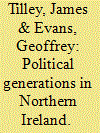

|
|
|
|
|
| Publication |
2011.
|
| Summary/Abstract |
Since the late 1980s, Northern Ireland has seen a radical electoral shift away from the historically dominant parties in the Catholic and Protestant blocs - the Social Democratic and Labour Party (SDLP) and Ulster Unionist Party (UUP), respectively - towards the traditionally more 'extreme' parties - Sinn Fein and the Democratic Unionist Party (DUP). This change in aggregate support has been accompanied by increasing differences between generations as older cohorts of UUP and SDLP supporters have been replaced by newer cohorts of DUP and Sinn Fein partisans. This is not a result of increased polarisation in values and attitudes (whether overtly political or simply communal intolerance) among younger cohorts who are, if anything, slightly more moderate than their forbears. Rather, this results from the changing political context in which new generations have been socialised - in particular the expanded choice sets facing voters as they have reached voting age. This in turn has positive implications for the consolidation of devolved democratic governance.
|
|
|
|
|
|
|
|
|
|
|
|
|
|
|
|